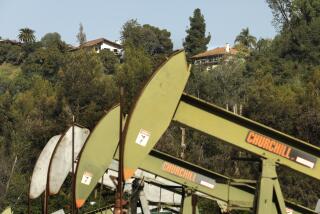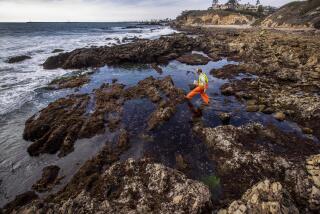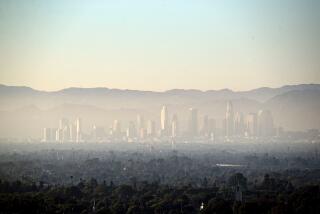The final BP cleanup
- Share via
Last year’s Gulf of Mexico oil spill has dropped out of the headlines, and according to a recent federal report, the spilled oil itself has mostly vanished. The only thing left to clean up is the nation’s regulatory system, but that’s shaping up to be a tougher job than skimming crude from the ocean.
President Obama’s oil spill panel came up with a sensible list of precautions Tuesday in its final report on the Deepwater Horizon catastrophe. Sen. Robert Menendez (D-N.J.) and Rep. Edward J. Markey (D-Mass.) vowed to introduce legislation incorporating many of the panel’s recommendations, including a provision to raise the $75-million cap on liability in offshore spills. But their attempts last year to remove the cap died, and with Republicans now in control of the House, their efforts stand even less chance of success.
The spill, described by Obama as “the worst environmental disaster America has ever faced,” hasn’t prompted the national reaction that Democrats and environmentalists thought it would. In part that’s because the recession has put other matters on the back burner in Congress, but in part it’s because they may have overstated the magnitude of the crisis. It’s impossible to assess the accuracy of claims like Obama’s because there is no way to know how many birds, fish and other sea creatures died as a result of the spill, nor how long it will take for their populations to recover, nor how that damage compares with the death toll of other environmental disasters. But it is clear that the spill’s effects aren’t lingering as long as past spills had led many to expect.
The Gulf of Mexico contains more seeps where oil leaks naturally into the ocean than any other body of water in or touching North America. The result is a healthy population of oil-eating bacteria — a population that soared as the Deepwater Horizon spill intensified and their food source expanded. This, combined with the extensive human cleanup effort, means most of the 207 million gallons of leaked oil is now gone. So did Obama and other Democrats overreact? For the sake of the gulf, we hope so. A clearer lesson from the disaster is that assurances by the industry that technological improvements had made spills a thing of the past were bunk, and that greater regulatory oversight is needed to prevent future blowouts.
The Obama administration might be justified in going a little easier on drilling proposals in the gulf, which has considerable natural immunity to spills, but must step up scrutiny in other areas — particularly the Arctic, where natural seeps are rare and weather conditions make cleaning up a Deepwater Horizon-size spill next to impossible. As Shell Oil seeks approval to drill in the environmentally sensitive Beaufort Sea north of Alaska, that’s something regulators should keep in mind.
More to Read
Sign up for Essential California
The most important California stories and recommendations in your inbox every morning.
You may occasionally receive promotional content from the Los Angeles Times.










